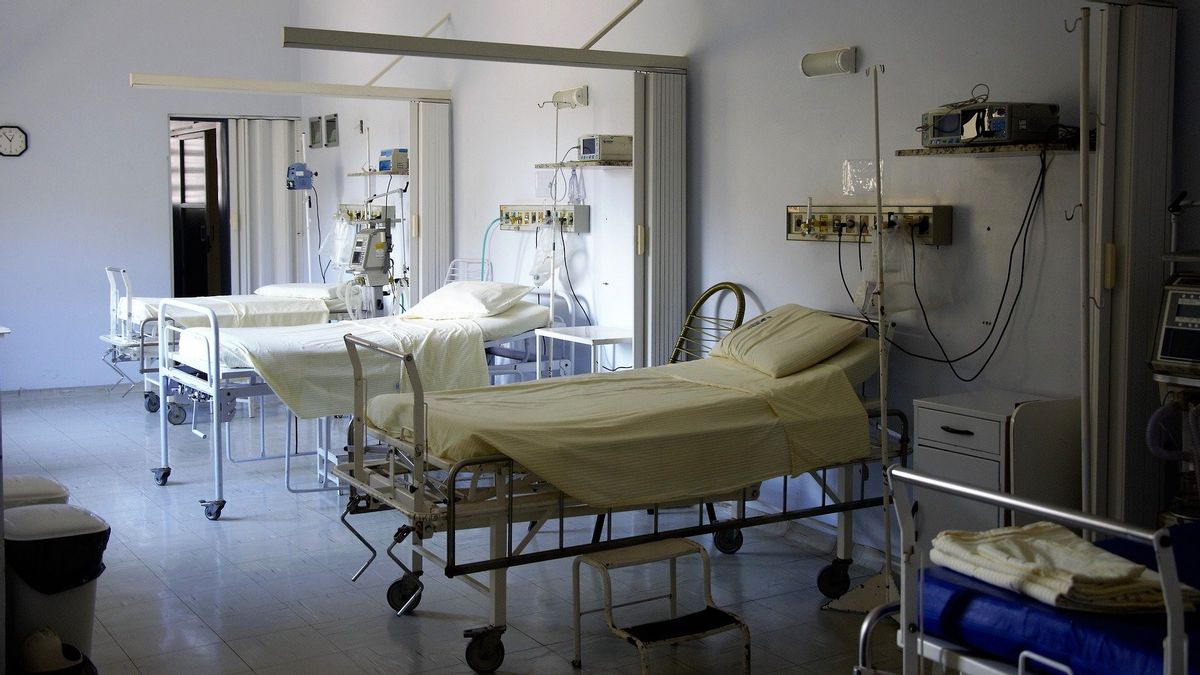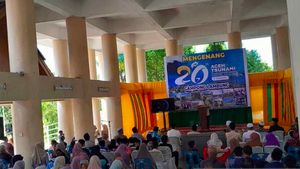JAKARTA - The spread of the corona virus or COVID-19 has become the center of world attention, including Indonesia which has set an emergency period until May 29. A number of obstacles in handling COVID-19 patients in Indonesia also occurred during this corona emergency status.
Among them, a few days ago on social media, a video circulated about a patient under COVID-19 surveillance who was rejected by the hospital. The hospital asked him to go to a bigger hospital for treatment.
Government spokesman for the handling of the corona virus, Achmad Yurianto said, in the incident, the hospital did not refuse, but because they did not have the ability to handle COVID-19, the patient was referred to a large hospital.
However, he said, the hospital's way of communication was wrong. The patient should be given a cover letter and a hospital that can treat it is determined.
"What happens is not refusing. The hospital feels that it does not have the capacity to care. He must refer. The method of referencing is (wrong) which (should) then be given a cover letter, where it is determined to be referred. It is not just released," said Yuri, Wednesday , March 18th.
Yuri said the hospital was sanctioned for wrong procedures. He said the sanctions were imposed by the hospital association. "It has been handled by the hospital association," said Yuri.

Government spokesman for the handling of the corona virus, Achmad Yurianto (Angga Nugraha / VOI)
Another problem is that several referral hospitals for handling COVID-19 do not periodically report cases of death from the virus to the central government. This made the patient and victim data error a while back.
Data on deaths throughout Indonesia due to COVID-19, as many as 7 people as of Tuesday, March 17. But the number jumped to 19 on Wednesday, March 18.
This figure was obtained after the Ministry of Health reconfirmed the death data to all hospitals that handle COVID-19. Until finally, it was revealed, a number of hospitals did not report any deaths from March 12 to March 17.
"We reported a death case, there was a problem in data collection because after we did a recheck this morning and then coordinated with all hospitals that treat this case, it turns out that several hospitals have not reported cases of death from March 12 to 17," said Yuri. adding that the number of patient spikes will increase over the next few years.
"We hope that after carrying out the activities with the community, it is hoped that in April we can see the results and we hope that this will be under control," said Yuri.
There is negative news, there is also positive news. Yesterday, Wednesday, March 18, the government collaborated with private hospitals to deal with the spread of COVID-19. There are three private hospitals that are taking part in the fight against this virus outbreak. Among them, Siloam Kelapa Dua Hospital, Mitra Keluarga Jatiasih Hospital, and Hermina Karawang Hospital. These three hospitals will dedicate all of their infrastructure to be used in nursing services, COVID-19 examination services.
In addition, the government is also working with laboratory networks to examine COVID-19 specimens. Among them are the Siloam laboratory network, Kalbe and the Bunda Group laboratory network.
With this assistance, it is hoped that they will no longer be fixated on government-owned hospitals in handling COVID-19. But from the private sector can also help on a large scale and can be serious to implement it.
"In this way, it is hoped that early detection of case detection will be carried out optimally," said Yurianto.

Chairman of the Indonesian Private Hospital Association (ARSSI) Susi Setiawaty said that his party would always follow directions from the government regarding the handling of COVID-19. However, they need support from the government regarding the procurement of medical devices, such as protective clothing.
"We are ready to help, but we also need support from the government, regarding the procurement of medical devices," said Susi.
The question of hospital rejection of corona patients, according to Susi, is a misunderstanding. From his conversations with the hospital and the doctor who treats the patient, there is absolutely no element of rejection. However, the hospital does not have the competence in handling COVID-19, so patients are advised to go to another hospital. Moreover, the patient's condition at that time did not show severe symptoms even though he was included in the category of patients under surveillance (PDP).
"So the person concerned is only in the low PDP category. So it was decided that he was not examined further and in this category he is obliged to carry out independent isolation," said Susi.

Al-Azhar University legal expert Suparji Ahmad assessed that the incident of refusing COVID-19 patients was a serious matter. He said, referring to Law Number 36 of 2009 concerning Health, hospitals that refuse a resident can be sentenced to two years imprisonment.
For this reason, the government is asked to be firm and wise in developing hospitals to put humanity ahead of profit. In addition, the government must implement these laws consistently. This is because the case of patient rejection by the hospital, this is not the only time this has happened.
"The existing sanctions should be applied consistently. If there is no way there must be a clear referral, the patient should not be neglected."
Al-Azhar University legal expert Suparji Ahmad
Sakadar information, in article 32 of Law Number 36 Year 2009 concerning Health, contains questions;
(1) In an emergency, health service facilities, both government and private, are obliged to provide health services for saving patient lives and preventing disability first. (2) In an emergency, health service facilities, both government and private, are prohibited from refusing patients and / or ask for an advance.
Then, the Article also contains the criminal provisions stated in Article 190, namely, it reads:
(1) Heads of health service facilities and / or health workers who practice or work at health service facilities who deliberately do not provide first aid to patients who are in an emergency situation as referred to in Article 32 paragraph (2) or Article 85 paragraph (2). ) shall be sentenced to imprisonment for a maximum of 2 (two) years and a maximum fine of Rp.200,000,000.00 (two hundred million rupiah). (2) In the event that the act as referred to in paragraph (1) results in disability or death, the head of the service facility health and / or health workers shall be punished with imprisonment of a maximum of 10 (ten) years and a maximum fine of Rp1,000,000,000.00 (one billion rupiah).
The English, Chinese, Japanese, Arabic, and French versions are automatically generated by the AI. So there may still be inaccuracies in translating, please always see Indonesian as our main language. (system supported by DigitalSiber.id)













